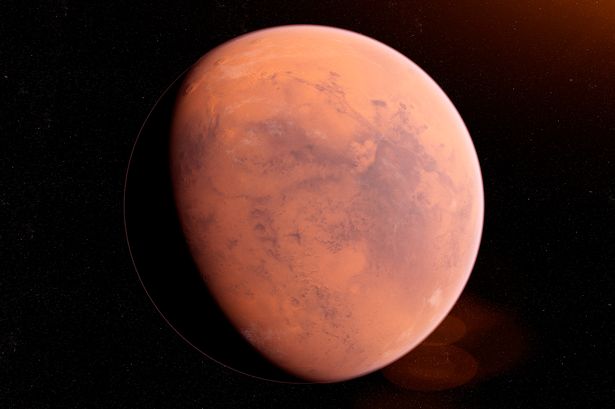Science
NASA Unveils Strongest Evidence of Past Life on Mars

NASA has announced a significant breakthrough in the search for life on Mars, revealing what it describes as the strongest evidence yet of past microbial activity on the planet. According to Dean Duffy, the new NASA administrator, a rock sample named “Sapphire Canyon,” collected by the Perseverance rover in July 2022, offers the clearest indication of life on Mars to date.
The sample was retrieved from a site characterized by rocky outcrops at the edges of Neretva Vallis, a river valley formed by ancient water flow into Jezero Crater. This crater, located in the planet’s northern hemisphere, was once home to a lake, making it a prime location for the search for ancient life. Since landing in 2021, the Perseverance rover has been diligently exploring this area, focusing on a former river delta where it has gathered a collection of geological samples.
Details of the Discovery
In total, the rover has collected 43 sample tubes, with 38 designated for scientific analysis and the remaining five serving as “witness tubes” to monitor the cleanliness of the sampling system throughout the mission. NASA officials shared their findings in a presentation, noting that the Mars 2020 Perseverance Rover is on a quest to search for signs of ancient microbial life, advancing the agency’s broader goal of understanding Mars’ past habitability.
“The rover is collecting core samples of Martian rock and regolith, with the intention of a future mission to return these samples to Earth for detailed examination,” the agency stated. Images transmitted back to Earth have revealed crystalline solids, remnants of water that once flowed across the Martian surface.
During the presentation, Joel Hurowitz, a scientist involved in the research, explained that subtle chemical signatures uncovered within the crater suggest that life may have existed on Mars billions of years ago. This finding represents the culmination of over three decades of scientific inquiry into the planet’s history.
Scientific Validation and Implications
The research findings have undergone a rigorous peer-review process, confirming that the samples likely have a biological origin. Professor Sanjeev Gupta, a planetary scientist from Imperial College London and a co-author of a study published in the journal Nature, emphasized the significance of these discoveries. “We’ve not had something like this before, so I think that’s the big deal,” he stated.
Gupta noted that the features observed in the rocks could be interpreted as products of biological activity, akin to microbial processes found on Earth. While the team is cautious in claiming they have definitively found signs of life, they acknowledge that the evidence provides a compelling avenue for further investigation.
As NASA continues to unravel the mysteries of Mars, this latest discovery adds to the growing body of evidence suggesting that the planet may once have been hospitable to life. The implications of these findings could reshape our understanding of life beyond Earth and fuel future missions aimed at exploring the Red Planet’s ancient environments.
-

 Health2 months ago
Health2 months agoNeurologist Warns Excessive Use of Supplements Can Harm Brain
-

 Health3 months ago
Health3 months agoFiona Phillips’ Husband Shares Heartfelt Update on Her Alzheimer’s Journey
-

 Science4 weeks ago
Science4 weeks agoBrian Cox Addresses Claims of Alien Probe in 3I/ATLAS Discovery
-

 Science4 weeks ago
Science4 weeks agoNASA Investigates Unusual Comet 3I/ATLAS; New Findings Emerge
-

 Science3 weeks ago
Science3 weeks agoScientists Examine 3I/ATLAS: Alien Artifact or Cosmic Oddity?
-

 Science3 weeks ago
Science3 weeks agoNASA Investigates Speedy Object 3I/ATLAS, Sparking Speculation
-

 Entertainment4 months ago
Entertainment4 months agoKerry Katona Discusses Future Baby Plans and Brian McFadden’s Wedding
-

 World2 months ago
World2 months agoCole Palmer’s Cryptic Message to Kobbie Mainoo Following Loan Talks
-

 Entertainment4 months ago
Entertainment4 months agoEmmerdale Faces Tension as Dylan and April’s Lives Hang in the Balance
-

 Science3 weeks ago
Science3 weeks agoNASA Scientists Explore Origins of 3I/ATLAS, a Fast-Moving Visitor
-

 Entertainment4 months ago
Entertainment4 months agoLove Island Star Toni Laite’s Mother Expresses Disappointment Over Coupling Decision
-

 Entertainment3 months ago
Entertainment3 months agoMajor Cast Changes at Coronation Street: Exits and Returns in 2025









